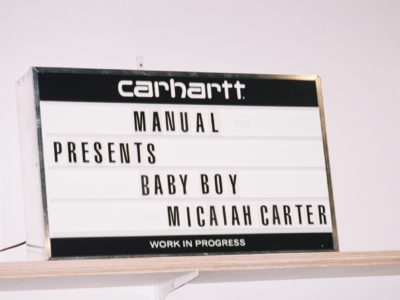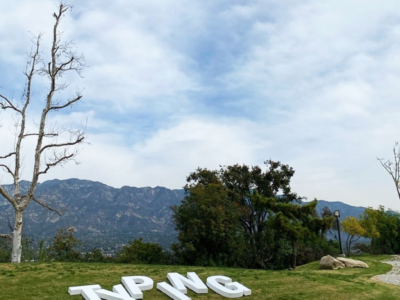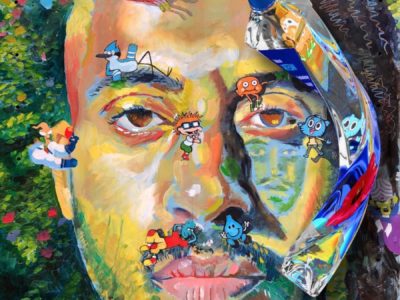Budding Artistry in the Mediterranean with Katherine Li
Budding Artistry in the Mediterranean with Katherine Li
WORDS BY : NIKOLE GUZMAN | PHOTOS BY : DORA DALILA
Fed up with the constraints of the American work grind and seeking a more lively, fulfilling lifestyle, Katherine Li Johnson decided to take some time to live abroad in Bali and Indonesia before ultimately relocating to Tunisia. Sandwiched between Algeria, Libya, and the Mediterranean Sea, the small North African country is 99% Muslim and the only democracy in the Arab world. Since the end of its revolution, Tunisia has transformed from a repressed society to a flourishing creative hub, springing a new generation of artists like Johnson.

Did you always see yourself living abroad? How did you come to live in Tunisia?
My mom is from Hong Kong and my dad is American. I grew up in Queens but spent much of my childhood summers in Hong Kong, and traveling through China with my family. I went to FIT briefly but dropped out to move to Tokyo in 2009, where I worked for American Apparel. My last role at the company was General Manager for Asia. I left the company, and Tokyo, in late 2015, and lived in South India and Bali before eventually ending up in Tunis. I think if anyone has the opportunity to live abroad at some point in their life then they absolutely should. You don’t really know what your chains are until you leave home and allow yourself to be something other than home’s expectations of you.
Were you just over the daily grind?
Well a big part of my decision revolved around the fact that I wanted to forego the traditional 9 to 5 and not go right back into a job I wasn’t sure about. I had job offers but I didn’t know if I wanted to return to a corporate setting, let alone continue working in the fashion industry. I slowly started taking photos and working on projects abroad and was in Paris when I decided to visit Tunis next. I had met some Tunisian friends years ago in China and they ended up recommending a bunch of places and setting me up to stay with their friends in the country. Two weeks turned into 2 months and by the end of 2017 I was using Tunis as a base.
Since you’re no longer doing the typical 40 hour week, what are your days like?
What I do depends on the day; I’m taking photos pretty regularly and I’m working on my first travel essays, about living abroad, and Tunisia. I’ve also been doing research for a small role I’m playing in a Tunisian short film where I’ll be speaking Chinese and Arabic. I haven’t ever acted before, so we’ll see how this goes.
These artists exercised their newfound voices and started to express themselves in ways they couldn't before. Tunis is ever changing and now there's a budding artistic scene.
Are there a lot of expats and tourists in Tunisia right now?
Even though there’s an embassy here, those I know who work there aren’t allowed to venture out of the “safe zones” in Tunisia. There’s a level of fear that we’ve developed in America that carries over when traveling. I realized that we’re taught to believe in and aspire for things that are very different from the rest of the world. It’s really easy to sort of conceptualize and build fears around the idea of something being different, like believing a country isn’t safe or stereotyping other cultures. Anyway, most of the friends I have now are actually Tunisian, which I prefer because it allows me to get out of my Western bubble.
What’s been the most interesting aspect of living in a country like Tunisia?
This is my first time living in a poorer country which has been eye opening. We’re accustomed to so much comfort and in the Western world. Before the revolution (Arab Spring) there were a lot of repressed, young artists who couldn’t express personal emotions, like their dissent towards the government. When Tunis finally became a democracy, it started growing as this African-meets- Mediterranean creative hub. These artists exercised their newfound voices and started to express themselves in ways they couldn’t before. Tunis is ever changing and now there’s a budding artistic scene.
In terms of the creatives who call Tunis home- my friend Sofia Guellaty founded a media platform called Mille, which focuses on topics relevant to the Arab world. Their main writer Amina Kaabi is one of my closest friends here in Tunis. My old friend, Dana Boulos, whom I know from American Apparel days, just directed a video for them in partnership with Gucci. I’m friends with Arab label, Habibi Funk, who throw a party in Tunis three times a year, and I’m always there dancing with friends; last time my friend Tania George, a designer from Jordan, flew in for two weeks and we went to his party together with the Mille girls. My friend A.L.A. is a rapper that blew up in the Arab world in the years following the Revolution. The scene here is rapidly changing but it’s been cool seeing the work my friends have been putting out.
Let’s talk about your travel essays.
Yeah, so I’ve been reading the works of Paul Theroux, probably the most well-known travel writer alive today and there’s this one book he wrote, The Pillars of Hercules, that I’ve really come to like. It’s about a trip he did in 1984 along the coast of the Mediterranean from Spain to Majorca where he ends up traveling through Tunisia. As it’s the 25th anniversary of his travels this year, I figured I would take the same trip he took and document it. There’s also going to be a presidential election in Tunis later this year so it’ll be super meaningful to get to witness that. I’ve been talking to a few people who are interested in publishing my writing, so we’ll see. At some point I would love to be able to pitch a travel book or book of travel essays.
Do you see yourself living abroad indefinitely?
I can’t predict the future so all I can say is that I’m thankful I’m able to travel, to have a supportive community back home and to have made friends abroad. As Americans, I think it’s easy to get caught up in what the government is doing domestically but there isn’t a very large conversation on how we’re affecting the rest of the world. I guess you can say I’ve kind of been feeling the Suzy Hansen effect. She’s this American journalist who moved to Istanbul because her favorite author, James Baldwin, lived there for a decade in the 60s, and she ended up writing Foreign Country: An American Abroad in a Post-American World. I think it’s interesting to be abroad and view America from a different lens, especially as someone who is close to the culture but removed enough. At this point in my life I would rather not get caught up in the domestic way of thinking but would rather explore what’s happening outside of that.









